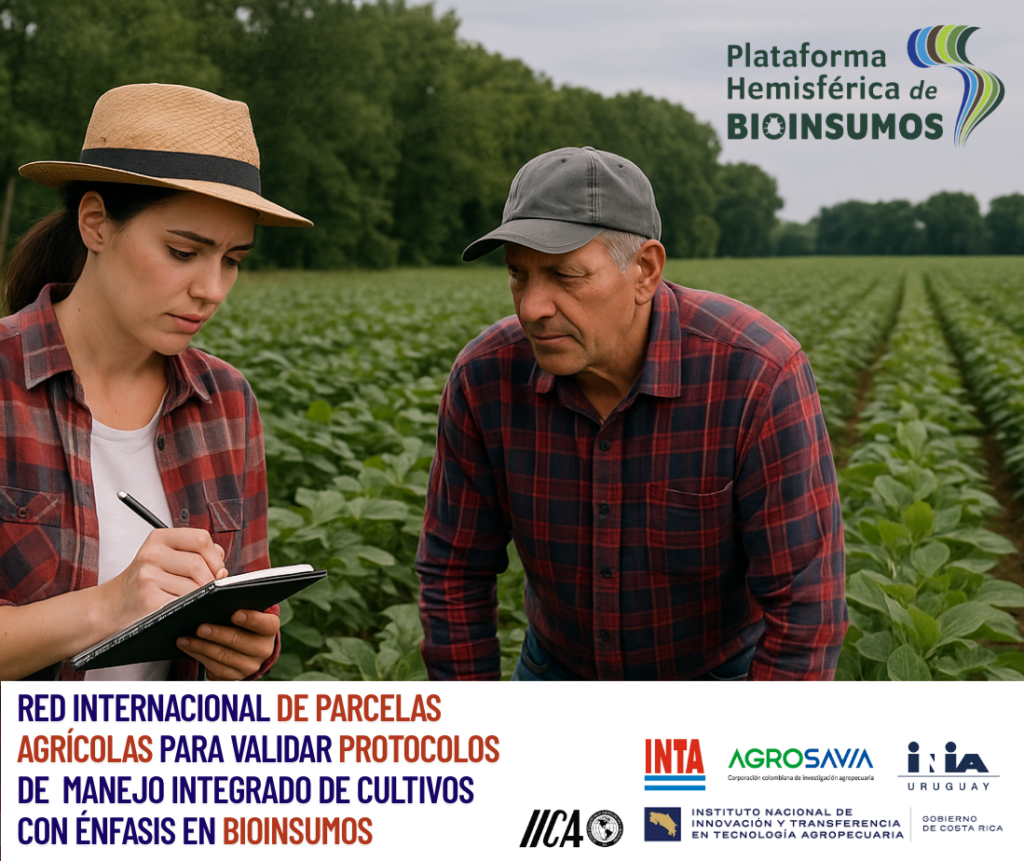
San José, 23 June 2025 (IICA) – Public and private sector experts from various countries in the Americas stated that bioinputs are a strategic technology for the transformation of agriculture and stressed the need to generate evidence for the development of public policies and regulatory frameworks that support their advancement.
During the launch webinar of the Agricultural Plots Network for the Validation of Integrated Crop Management Protocols with a Focus on Bioinputs—organized by the Hemispheric Bioinputs Platform (PHB), whose executive secretariat is managed by the Inter-American Institute for Cooperation on Agriculture (IICA)—specialists discussed the scientific and technical aspects of the challenges and opportunities in this field.
This initiative is led by the PHB’s Knowledge Circle on Scientific and Technological Development and arises in response to the growing need to generate field-based evidence to support the effectiveness, safety, and scalability of biological technologies under different agroecological conditions in Latin America and the Caribbean.
A regional tool to generate adapted knowledge
The network is designed as a technical and collaborative tool that allows participating countries to adapt and validate integrated management protocols, combining biologically based technologies with other conventional solutions, under an agroecological and science-based approach. In this way, combined strategies for pest, disease, and plant nutrition management will be evaluated in crops of high economic and environmental interest, while generating useful data for the development of public policies and evidence-based regulatory frameworks.
Technical cooperation and collaborative work
The initiative includes participation from leading agricultural research institutions such as INTA (Argentina), AGROSAVIA (Colombia), INTA (Costa Rica), and a private company from Ecuador, along with technical cooperation from IICA. It is also open to the participation of new countries and institutions interested in establishing pilot plots in their territories.
The meeting drew strong interest from dozens of producers across 16 countries in the region.
Bioinputs have gained significant importance in recent years due to their ability to enhance the productivity and sustainability of agrifood systems in Latin America and the Caribbean (LAC), where producers face challenges such as the spread of pests and diseases and soil degradation.
However, their use remains limited due to factors such as lack of knowledge and training among many farmers, barriers to access due to cost, and the absence of regulation and quality standards, among other issues.
Productivity and conservation
Sergio Abarca, from Costa Rica’s National Institute for Agricultural Innovation and Transfer (INTA), explained that all countries in the region are increasingly promoting the use of bioinputs to address productivity and resource conservation challenges.
“We are seeing a growing interest in bioinputs everywhere, and we are convinced that only through joint efforts can we pave the way toward a greater role for them in agriculture,” said Abarca.
“It is essential to move toward reducing the chemical load in crops and to seek local solutions. That’s why the exchange of experiences among specialists from different countries is such a significant event,” he added.
For his part, Andrés Polack, a researcher at Argentina’s National Institute of Agricultural Technology (INTA), acknowledged that “there is a lack of documented scientific evidence from practical experiences that not only demonstrates the biological benefits of bioinputs, but also the economic benefits—which, ultimately, is what most interests the producer.”
In that sense, Polack announced that, with IICA’s support, a trial will be conducted in July in four countries—Argentina, Costa Rica, Colombia, and Ecuador—focused on a single crop to study the differences between conventional management and management with bioinputs. Companies, producers, technical advisors, and the public sector will participate.
Harold Gamboa, Specialist in IICA’s Innovation and Bioeconomy Program and Executive Secretary of the Hemispheric Bioinputs Platform (PHB), emphasized the importance of this effort as a concrete step toward building a regional innovation ecosystem for bioinputs. Such a system would improve technical and regulatory decision-making and promote the transition to more sustainable and regenerative agricultural models in the Americas.
The Hemispheric Bioinputs Platform was established in 2023 through a collaborative effort by FONTAGRO, IICA, and public research institutions in the region (NARIs).
In 2024, the first Pan-American Bioinputs Forum was held in Panama, resulting in a joint call to create a regional cooperation mechanism on the topic. Leading regional experts also shared their perspectives and experiences.
During the forum, it was noted that Latin America has advantages for promoting bioinputs as a strategic technology for the transformation of agriculture, but seizing these opportunities requires efforts to advance science, technology, and innovation; to generate policies and regulations; and to promote the bioinputs market to attract long-term investments in production.
More information:
Institutional Communication Division.
comunicacion.institucional@iica.int











